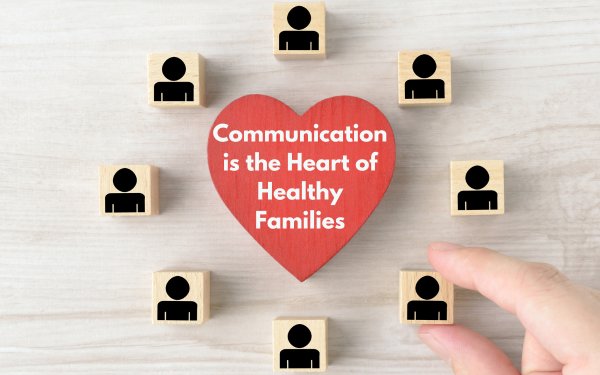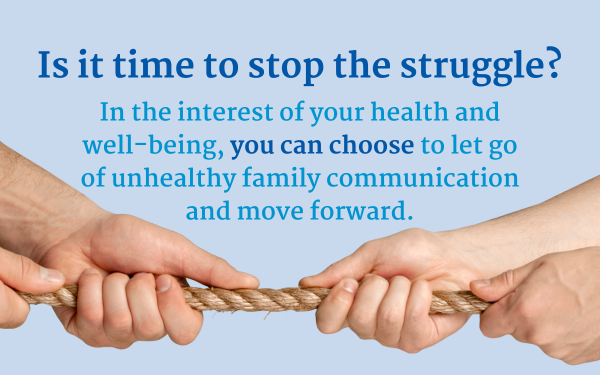How Family Relationships Impact Our Quality Of Life: Living Well Includes Nurturing Healthy Family Connections at Any Age.
 We understand that for some, the subject of family can feel a bit “heavy” compared to other topics, yet it is a vital subject for all of us to consider.
We understand that for some, the subject of family can feel a bit “heavy” compared to other topics, yet it is a vital subject for all of us to consider.
Family is an essential pillar of our lives. It’s where we learn the most critical life lessons, develop deep bonds, and create memories that last a lifetime. However, as life gets busier and more complex, maintaining healthy family relationships can become challenging; even the strongest families can encounter issues that lead to strained relationships. Patients discuss with me all the time the stress they are under.
Whether it’s due to a lack of communication, misunderstandings, or simply growing apart over time, these troubles can adversely affect our well-being and overall quality of life. Fortunately, there are several strategies you can use to improve your family relationships and ensure they remain strong for years to come. Let’s explore the importance of healthy family communication and, to the degree possible, why enhancing our connections can help us enjoy a happier, healthier existence.
The Challenge: Maintain Healthy Family Communication
Healthy communication is crucial to every family member’s mental, emotional, and physical well-being. After all, maintaining open and honest communication without judgment in any relationship helps us feel heard and understood.
Although we may disagree with family members’ choices, providing space for others to share thoughts, feelings, ideas, and concerns creates a supportive environment where everyone feels valued.
Because LIVING WELL includes THINKING WELL, we owe it to ourselves to understand how communication with family members impacts our overall mental, emotional, and physical health.
Family Communication and Our Mental Health
![]() Holistic health includes a mindful approach to communication within families. Poor communication negatively impacts mental health, leading to depression and excessive cortisol levels, causing stress which can be detrimental to one’s well-being. As hard as it might sometimes be, open communication is vital in maintaining peace and harmony within the household.
Holistic health includes a mindful approach to communication within families. Poor communication negatively impacts mental health, leading to depression and excessive cortisol levels, causing stress which can be detrimental to one’s well-being. As hard as it might sometimes be, open communication is vital in maintaining peace and harmony within the household.
When individuals do not feel heard or accepted by their loved ones, it leads to feelings of isolation and disconnection from others. This lack of support can have dire consequences for mental health, as it increases the likelihood of developing depressive symptoms. Cortisol levels may also rise due to this added stressor, resulting in mental exhaustion and burnout.
In an article titled “The Neuroscience of Conversations,” Psychology Today reported, “As we communicate, our brains trigger a neurochemical cocktail that makes us feel either good or bad, and we translate that inner experience into words, sentences, and stories.
‘Feel good’ conversations trigger higher levels of dopamine, oxytocin, endorphins, and other biochemicals that give us a sense of well-being.”
By prioritizing effective communication strategies that improve acceptance and understanding within families’ homes, individuals are better equipped to manage their emotions positively while promoting holistic wellness in mind and body alike.
Family Communication and Our Emotional Health
![]() Emotional awareness is mandatory for healthy communication. According to an article published by the National Institutes of Health National Center for Biotechnology Information,
Emotional awareness is mandatory for healthy communication. According to an article published by the National Institutes of Health National Center for Biotechnology Information,
“Emotional awareness is the ability to conceptualize and describe one’s own emotions and those of others” and “…the capacity to be aware of one’s own emotions plays a vital role in the ability to function both as an individual striving for self-actualization and as a social being striving for harmonious social relationships and intimacy.” (Blatt 2008)
Balancing our natural tendencies for immediate verbal expression with mindful listening, empathy, and forgiveness builds our emotional awareness and acceptance of others. In our family of origin, we may not have learned to regulate our emotions, but we can learn to develop this skill set. For adults, especially those with fractured family connections, it takes significant work and practice to improve communication skills. Still, you owe it to your holistic health journey to do the hard work. Family wounds can be deep, but we can choose to pursue emotional healing regardless of whether or not reconciliation between family members occurs.
Ultimately, the roots of healthy human interaction are modeled for us by our parents and other adults in our circle, but for many of us, they were not. However, as we mature, we are allowed “do-overs,” and we can actively choose to improve our family tree.
So, for parents of young children, regardless of what you learned from your family’s communication style, balancing verbal expression with refined listening skills will go a long way in fostering your child’s emotional health as they mature. After all, in life, learned behavior is more caught than taught.
Author James Baldwin said it best: “Children have never been very good at listening to their elders, but they have never failed to imitate them.”
It’s so true.
Family Communication and Our Physical Health
![]() The relationship between good communication and good physical health is multifaceted and complex. Forgiveness is crucial in this connection, as holding grudges can negatively impact relationships and increase stress levels. Stress, in turn, raises cortisol levels, leading to digestive issues, anxiety, appetite changes, and even eating disorders. Elevated stress levels also contribute to high blood pressure and activate the body’s fight or flight response, harming our heart’s health.
The relationship between good communication and good physical health is multifaceted and complex. Forgiveness is crucial in this connection, as holding grudges can negatively impact relationships and increase stress levels. Stress, in turn, raises cortisol levels, leading to digestive issues, anxiety, appetite changes, and even eating disorders. Elevated stress levels also contribute to high blood pressure and activate the body’s fight or flight response, harming our heart’s health.
However, effective family communication that fosters healthy relationships reduces stress levels allowing for better mobility and overall mind-body connectivity leading to improved cardiovascular function.
Moreover, enhancing the mind-body connection through practices such as massage therapy and chiropractic care promotes spinal alignment leading to better blood flow throughout the body, ultimately contributing towards optimal physical health.
Navigating Family Conflict and Unhealthy Communication
 Conflict is inevitable in all relationships, but it can be particularly distressing between family members. When (not if) disagreements arise, communicating calmly and respectfully can prevent arguments from escalating into full-blown fights. Instead of bottling up emotions or holding grudges against one another, healthy communication encourages active listening, empathy towards others’ perspectives, and finding solutions together.
Conflict is inevitable in all relationships, but it can be particularly distressing between family members. When (not if) disagreements arise, communicating calmly and respectfully can prevent arguments from escalating into full-blown fights. Instead of bottling up emotions or holding grudges against one another, healthy communication encourages active listening, empathy towards others’ perspectives, and finding solutions together.
We understand that some family relationships have sadly moved beyond the point of repair. Yes, you are related to your family members by birth or adoption. Yes, all relationships are worth an attempt toward reconciliation. But, no, you are not required to tolerate unhealthy family relationships simply because you are related.
In your best interest, you can attempt to repair a broken family relationship (if the other person is willing), forgive and peacefully tolerate them in social situations while keeping a healthy distance, or permit yourself to end communication altogether. Even when it comes to family, a toxic relationship is not worth the toll it can have on your mind and body.
The bottom line is that some family relationships are lovely, supportive, and nurturing, while others are complicated, challenging, and stressful.
But, regardless of a relationship’s quality, as adults, we have the freedom to improve family connections if we choose or release them if they negatively impact our mental, emotional, or physical well-being.
For all chiropractic care-related questions, contact Dr. Vivian Ebert of LivingWell Chiropractic in Bonita Springs, FL, located in The Brooks Town Center at the northwest corner of Three Oaks Parkway and Coconut Road. LivingWell Chiropractic provides state-of-the-art chiropractic care, spinal decompression, medical massage, and nutritional guidance with a holistic wellness approach focused on pain relief for patients with musculoskeletal conditions. Centrally located in Bonita Springs, the office is convenient for patients from Naples, Bonita Springs, Estero, and South Fort Myers.
Posted In:
Think Well Articles
